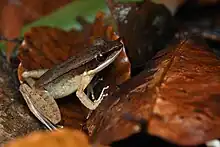| Sri Lankan golden-backed frog | |
|---|---|
 | |
| Scientific classification | |
| Domain: | Eukaryota |
| Kingdom: | Animalia |
| Phylum: | Chordata |
| Class: | Amphibia |
| Order: | Anura |
| Family: | Ranidae |
| Genus: | Indosylvirana |
| Species: | I. serendipi |
| Binomial name | |
| Indosylvirana serendipi (Biju, Garg, Mahony, Wijayathilaka, Senevirathne, and Meegaskumbura, 2014) | |
| Synonyms[2] | |
|
Hylarana serendipi Biju, Garg, Mahony, Wijayathilaka, Senevirathne, and Meegaskumbura, 2014 | |
Indosylvirana serendipi, or the Sri Lankan golden-backed frog, is a species of frog in the family Ranidae. It is endemic to Sri Lanka.[3]
Description
Body slender and head small. Supertympanic ridge absent. Subarticular tubercles prominent on toes. Third toe webbing extends up to the disc on the outside. Loreal region acute. Vomerine ridge present. Dermal fringe present. Dorsum reddish-brown with black. Tympanum area dark brown. Upper lip with a white stripe. Iris reddish brown with golden specks and dark patches. Flanks light yellowish-gray. Light brown limbs with grayish cross-bands. Ventrum whitish. Throat and limbs light grey. Male has a nuptial pad.[4]
Distribution
The frog is point endemic, where specimen only found from Kudawa araa of Sinharaja rain forest.[5]
Ecology
Its natural habitats are tropical lowland evergreen forests, banks of streams and in marshy areas.
References
- ↑ IUCN SSC Amphibian Specialist Group (2004). "Indosylvirana serendipi". IUCN Red List of Threatened Species. 2020: e.T73788858A73788862. doi:10.2305/IUCN.UK.2020-3.RLTS.T73788858A73788862.en. Retrieved 19 May 2023.
- ↑ "Indosylvirana serendipi (Biju, Garg, Mahony, Wijayathilaka, Senevirathne, and Meegaskumbura, 2014)". Amphibian Species of the World: an Online Reference. Version 6.0. American Museum of Natural History. 2019. Retrieved 5 October 2019.
- ↑ "Indosylvirana serendipi". amphibiaweb. Retrieved 3 February 2019.
- ↑ "DNA Barcoding, Phylogeny and Systematics of Golden-backed Frogs (Hylarana, Ranidae) of the Western Ghats-Sri Lanka Biodiversity Hotspot, with the Description of Seven New Species". Novataxa. 30 October 2014. Retrieved 3 February 2019.
- ↑ "Geographic distribution of two species of the Hylarana temporalis". Retrieved 3 February 2019.
